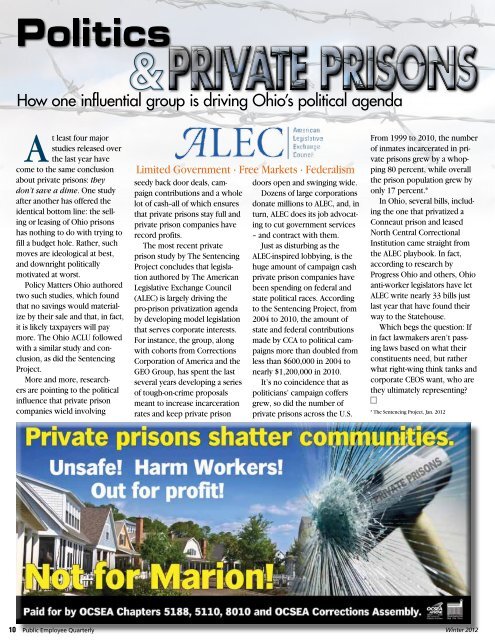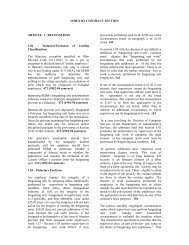Download - OCSEA
Download - OCSEA
Download - OCSEA
Create successful ePaper yourself
Turn your PDF publications into a flip-book with our unique Google optimized e-Paper software.
How one influential group is driving Ohio’s political agenda<br />
At least four major<br />
studies released over<br />
the last year have<br />
come to the same conclusion<br />
about private prisons: they<br />
don’t save a dime. One study<br />
after another has offered the<br />
identical bottom line: the selling<br />
or leasing of Ohio prisons<br />
has nothing to do with trying to<br />
fill a budget hole. Rather, such<br />
moves are ideological at best,<br />
and downright politically<br />
motivated at worst.<br />
Policy Matters Ohio authored<br />
two such studies, which found<br />
that no savings would materialize<br />
by their sale and that, in fact,<br />
it is likely taxpayers will pay<br />
more. The Ohio ACLU followed<br />
with a similar study and conclusion,<br />
as did the Sentencing<br />
Project.<br />
More and more, researchers<br />
are pointing to the political<br />
influence that private prison<br />
companies wield involving<br />
Limited Government · Free Markets · Federalism<br />
seedy back door deals, campaign<br />
contributions and a whole<br />
lot of cash--all of which ensures<br />
that private prisons stay full and<br />
private prison companies have<br />
record profits.<br />
The most recent private<br />
prison study by The Sentencing<br />
Project concludes that legislation<br />
authored by The American<br />
Legislative Exchange Council<br />
(ALEC) is largely driving the<br />
pro-prison privatization agenda<br />
by developing model legislation<br />
that serves corporate interests.<br />
For instance, the group, along<br />
with cohorts from Corrections<br />
Corporation of America and the<br />
GEO Group, has spent the last<br />
several years developing a series<br />
of tough-on-crime proposals<br />
meant to increase incarceration<br />
rates and keep private prison<br />
doors open and swinging wide.<br />
Dozens of large corporations<br />
donate millions to ALEC, and, in<br />
turn, ALEC does its job advocating<br />
to cut government services<br />
– and contract with them.<br />
Just as disturbing as the<br />
ALEC-inspired lobbying, is the<br />
huge amount of campaign cash<br />
private prison companies have<br />
been spending on federal and<br />
state political races. According<br />
to the Sentencing Project, from<br />
2004 to 2010, the amount of<br />
state and federal contributions<br />
made by CCA to political campaigns<br />
more than doubled from<br />
less than $600,000 in 2004 to<br />
nearly $1,200,000 in 2010.<br />
It’s no coincidence that as<br />
politicians’ campaign coffers<br />
grew, so did the number of<br />
private prisons across the U.S.<br />
From 1999 to 2010, the number<br />
of inmates incarcerated in private<br />
prisons grew by a whopping<br />
80 percent, while overall<br />
the prison population grew by<br />
only 17 percent.*<br />
In Ohio, several bills, including<br />
the one that privatized a<br />
Conneaut prison and leased<br />
North Central Correctional<br />
Institution came straight from<br />
the ALEC playbook. In fact,<br />
according to research by<br />
Progress Ohio and others, Ohio<br />
anti-worker legislators have let<br />
ALEC write nearly 33 bills just<br />
last year that have found their<br />
way to the Statehouse.<br />
Which begs the question: If<br />
in fact lawmakers aren’t passing<br />
laws based on what their<br />
constituents need, but rather<br />
what right-wing think tanks and<br />
corporate CEOS want, who are<br />
they ultimately representing?<br />
* The Sentencing Project, Jan. 2012<br />
10 Public Employee Quarterly Winter 2012
















